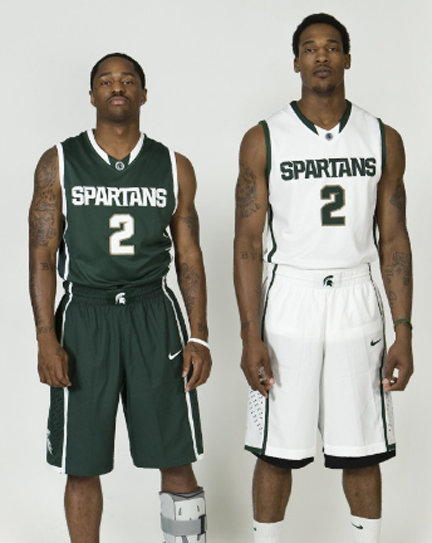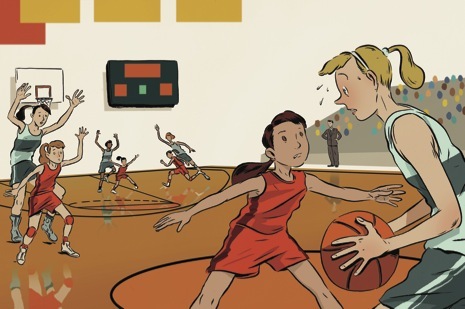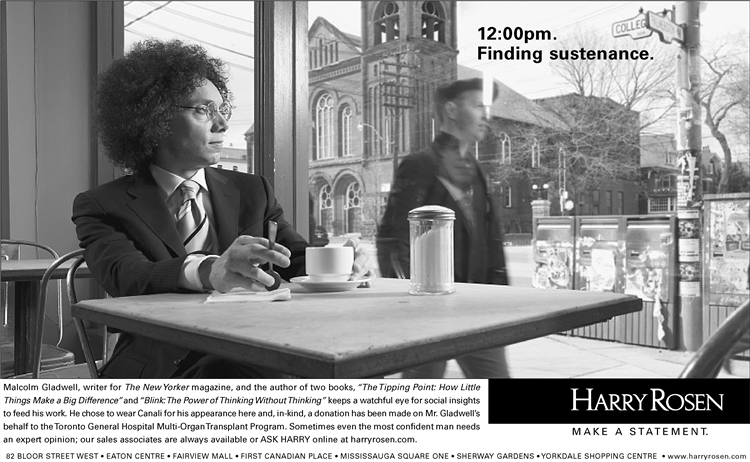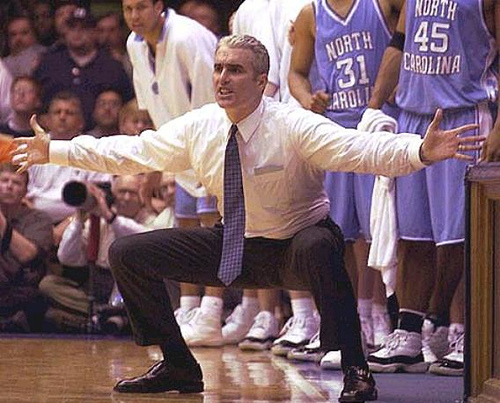We think we’ve isolated what Gladwell’s problem derives from on the fallacious full-court press argument he made last week. Put simply, he’s drinking the Rick Pitino kool-aid. We don’t blame him, Pitino is an engaging guy who can sell ice cubes to eskimos, and Gladwell wouldn’t be the first to slurp it all up (ask Karen Sypher or any Boston Celtic fan ca. 1997-98). But it appears that Pitino is his sole source of information when it comes to how underdogs win basketball games, and somehow Coach P has convinced Gladwell that much of his collegiate success is based on undertalented yet hungry players who were able to maniacally pressure Goliaths into turnovers and easy buckets. It’s almost as if Gladwell doesn’t realize that Pitino has been a Goliath for most of his career, nor does he realize that there are probably better ways of accomplishing a similar result (i.e., slowing games down to a crawl). In this week’s back-and-forth with Bill Simmons, Gladwell writes:
You’re right. I am a bit obsessed with the full-court press at the moment. I just did a story for The New Yorker about how underdogs beat favorites, which had a lot about basketball in it. For the story, I went down to Louisville and had a long chat with Rick Pitino. He argued that the press is the best chance an underdog has of being competitive with stronger teams, and I think his record proves the case. That Providence team he took to the Final Four in 1984 has to have been just about the least talented team EVER to reach that level. Then, of course, Pitino takes one of his first Louisville teams to the Final Four in 2006 and this season’s team to the Elite Eight, and no one’s going to argue that either of those teams were filled with future Hall of Famers.
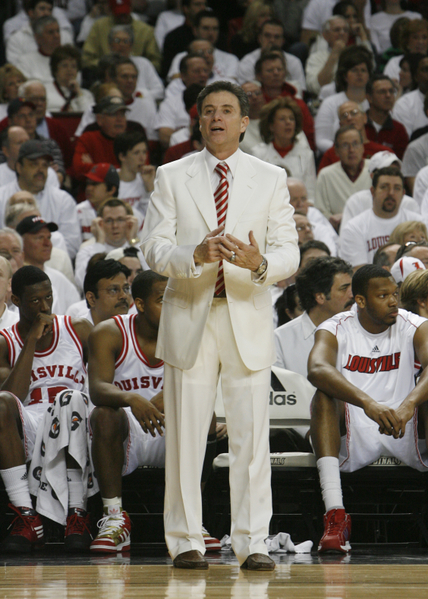
First of all, it was 1987, not 1984, when Pitino’s Providence team went to the F4, and we contend that it was Pitino’s early-adoption of the just-instituted three-point shot that gave his team a competitive advantage that season more than their use of full-court pressure defense. PC set records that still stand today at the school for taking (665) and making (280) threes (over 8 per game), led by their sharpshooting guards Delray Brooks and of course, Billy Donovan. Traditional powers from the early to mid-80s such as Georgetown and Louisville were slower to utilize the new shot, and as such, they quickly became less relevant over the next several years until they realized its value. Providence’s full-court press was important to achieving that success, but the three-point shot was decidedly more important.
Secondly, least talented team EVER to make the F4? George Mason 2006, Wisconsin 2000, LSU 1986, among others… say hello.
Finally, his record proves the case? How? Pitino is a masterful recruiter, and this is nothing new to anyone who has followed college hoops during the last twenty years. While it’s true that his BU and Providence teams weren’t particularly talented, his teams dating from 1992-97 at Kentucky and 2002-09 at Louisville were mostly loaded. We thought the argument Gladwell tried to make here is that the full-court press levels the playing field for the Davids of the world vs. the Goliaths, right? How is using Rick Pitino’s teams, the majority of which were exceptionally athletic AND talented, as your example of this? The 2005 Louisville team (Pitino’s fourth season at the school, btw) went 33-5, had an all-american wing playmaker in Francisco Garcia and a very good point guard named Taquan Dean to go along with the standard Pitino cast of numerous replaceable parts – all long, lean and athletic. That team was a #2 seed (corrected: #4 seed) in a region where the common perception was that the Cards were a better team than the #1 seeded Washington Huskies. This is supposed to be a scrappy group of underdogs? And who among our faithful readers is going to swallow the argument that the 2009 Louisville team (a #1 seed and preseason favorite along with UNC and UConn) wouldn’t have been nearly as good without their press, as Gladwell implies. What about Earl Clark? Terrence Williams? Does he not realize that these two were among the best dozen or so players in college basketball this season?
And what about this indefensible jewel regarding Louisville center (and freshman all-american) Samardo Samuels?
When we were talking, Pitino called over Samardo Samuels, who is, of course, Jamaican — his point being that this was his ideal kind of player, someone who substituted for a lack of experience with a lot of hunger. There is something weird, isn’t there — and also strangely beautiful — about a coach who deliberately seeks out players who aren’t the most talented?
Right. The same player who was the 2008 USA Today POY at the high school level and rated #9 overall in his class by Rivals isn’t the most talented. Jamal Mashburn, Tony Delk, Antoine Walker, Ron Mercer, Derek Anderson, David Padgett, Juan Palacios, Derrick Caracter, Jerry Smith and many others were also lesser-talented players whom Pitino plucked from the bottom of the barrel because of their innate hunger (not talent). (Amir Johnson, Sebastian Telfair and most recently Jeremy Tyler are additional lesser-talented players whom Pitino sought for their hunger only to be disappointed when they headed straight to the pros… because they were less talented.)

Yeah, Samuels is Undertalented
Gladwell has fallen hard for the Pitino pitch. Here’s more.
There are two other things here that fascinate me. After my piece ran in The New Yorker, one of the most common responses I got was people saying, well, the reason more people don’t use the press is that it can be beaten with a well-coached team and a good point guard. That is (A) absolutely true and (B) beside the point. The press doesn’t guarantee victory. It simply represents the underdog’s best chance of victory. It raises their odds from zero to maybe 50-50. I think, in fact, that you can argue that a pressing team is always going to have real difficulty against a truly elite team. But so what? Everyone, regardless of how they play, is going to have real difficulty against truly elite teams. It’s not a strategy for being the best. It’s a strategy for being better. I never thought Louisville — or, for that matter, Missouri — had a realistic shot at winning it all in the NCAAs this year. But if neither of those teams pressed, they wouldn’t have been there in the first place.
Let’s break this down again, because it’s clear that Gladwell does not understand why he’s wrong about this. Louisville and Missouri have elite talent and elite athletes at the college level. Their pressure defense only makes them better because they’re already really good to begin with. These two teams are not and never were underdogs in the David mold. They’re excellent college basketball teams and that statement would be true no matter what style of defense they chose to play. The elite teams that Gladwell mentions a pressing team will always have trouble against – yeah, what he’s failing to recognize is that Louisville and Mizzou are the Goliaths in that scenario.
A true David in the college game is a team that is outclassed from a talent and/or athletic perspective. Often it’s both. If a team deficient in one or both of these areas tries to press a legitimate Goliath such as a UConn, Michigan St. or Oklahoma this year, they’d have gotten crucified. A pressing team at the collegiate level must, must, must have good athletes (and enough of them) to become successful; otherwise, the elite guards populating rosters on the Goliaths will absolutely destroy it. There’s a reason that the few pressing teams that pull major upsets in the NCAA Tourney, while somewhat lacking on skill, are always full of guys who can run, jump and terrorize teams with their long arms and defensive activity. We’re thinking of Bruce Pearl’s teams at UW-Milwaukee and Mike Anderson’s UAB teams as good examples. Short on individual talent, but long on athleticism.
So what do you do if you’re a David who is short on both? Gladwell suggests that full-court pressure evens things up, and uses his junior high girls basketball example as evidence to that fact. The problem, which we covered in our previous examination of this topic, is that at the collegiate level, a team that is significantly less skillful and less athletic than its opponent will suffer extreme humiliation by employing this strategy. The proper way to combat this is to instead slow the game down, limit possessions, run an efficient offense and play hard-nosed halfcourt defense. Princeton did this to UCLA, Bucknell did this to Kansas, Vermont did this to Syracuse, and there are many, many other successful examples. Seriously, does anyone in their right minds believe that those three teams could have pulled the upsets by pressing the Goliath?
It’s preposterous, yet that’s what Gladwell would have us believe.
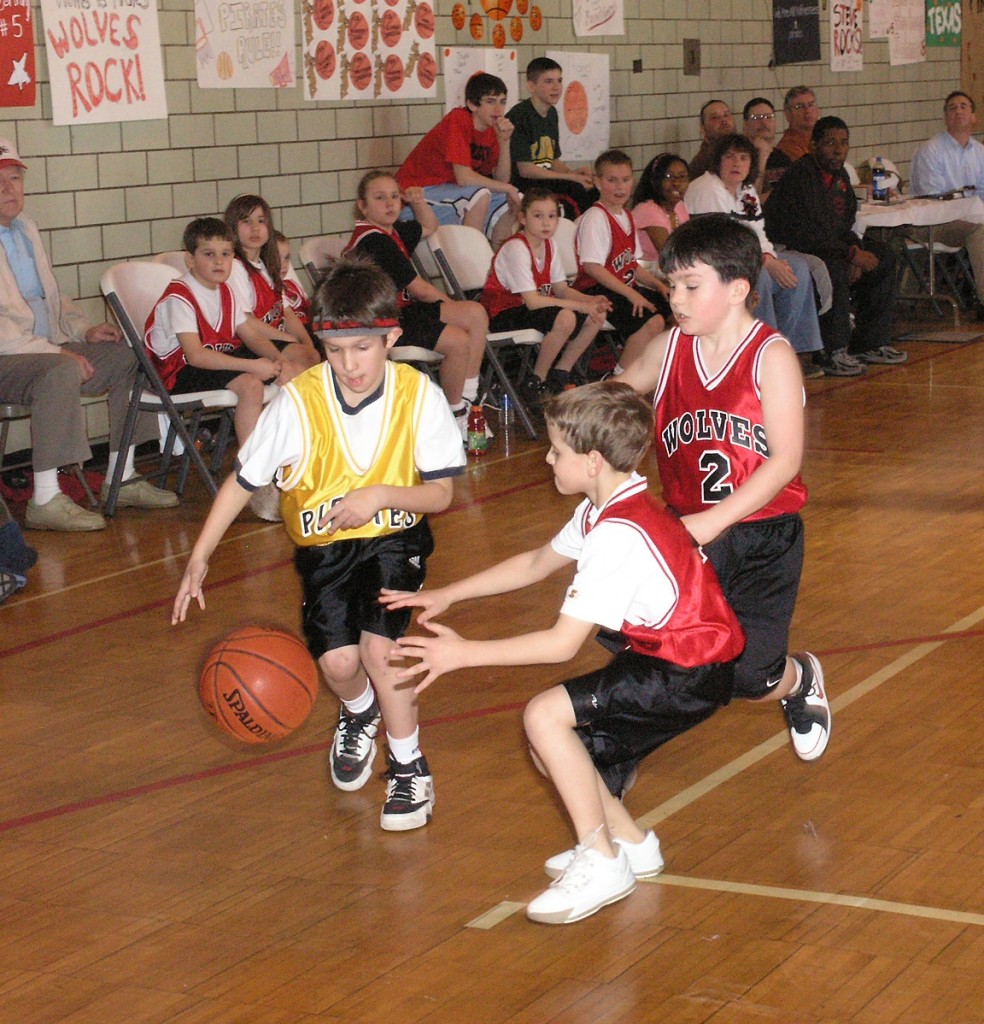
You Need Athletes to Make This Work
The bottom line is this. Successful pressing requires athletes at the elite level of college basketball. If you do not have athletes (and most Davids don’t), then you will get run ouf of the gym as Goliath scores layup after dunk after layup on your smaller, slower team. Your best strategy is instead to slow the game down and limit possessions while playing smart basketball on both ends. We see upsets like this nearly every year in the NCAA Tournament. The one caveat, however, is if you have players who can match up reasonably well with a Goliath from an athletic standpoint, then you may consider pressing as a viable strategy. The problem with this, of course, is that it’s fairly rare in the college game that a true David will have that kind of athletic stable at their disposal. If you’re lucky enough to have both talent and athletes to run a press (as Pitino has had throughout much of his career, along with Nolan Richardson and some others), then such a strategy can devastate opponents – the real question should be why more Goliaths don’t institute the full-court press, rather than Davids. This is why we continue to argue that full-court pressure defense is a better strategy for an elite team rather than an underdog – those teams already have the proper tools of talent and athleticism to employ it.






























